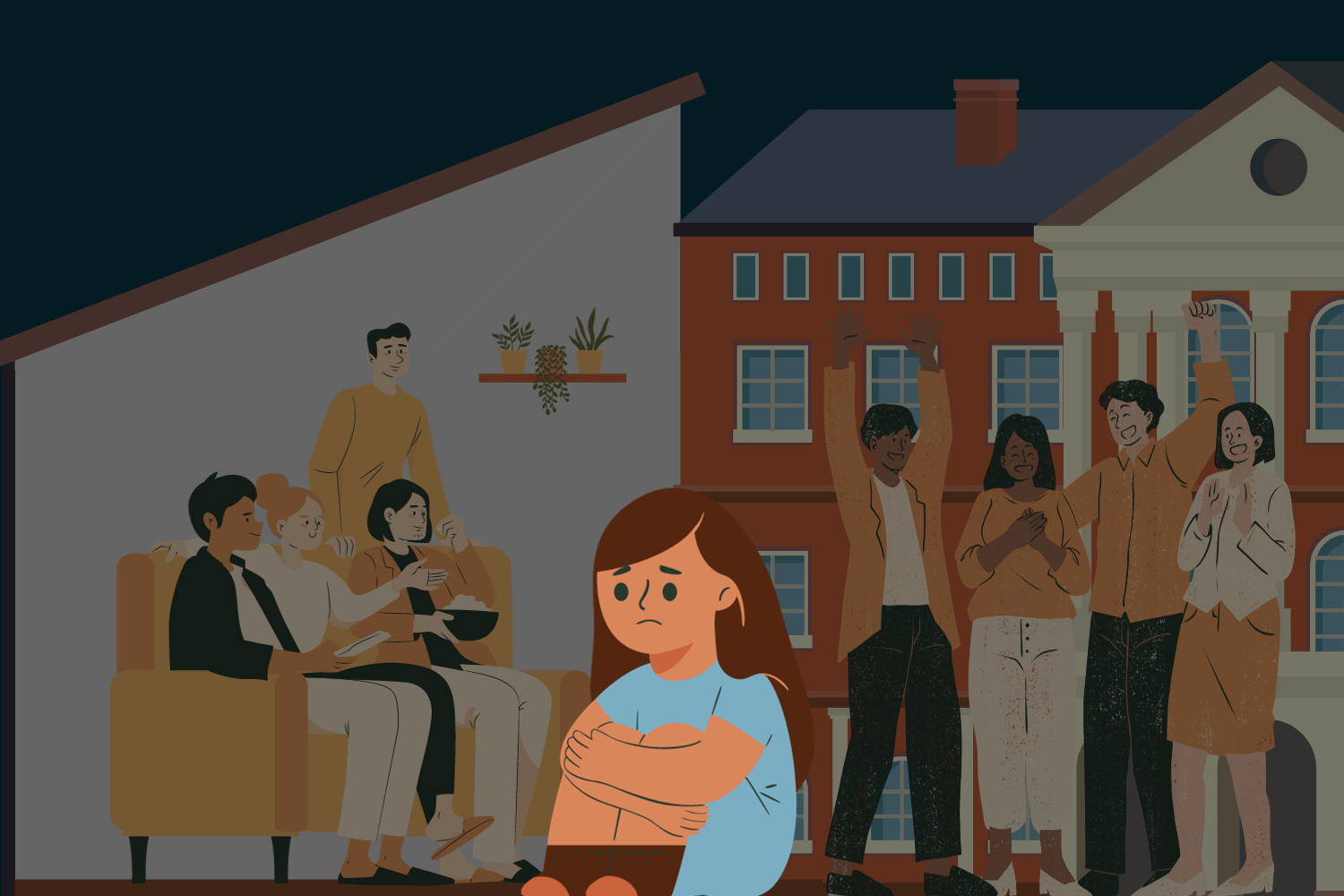You lie bundled under the covers, watching as the rain gently patters against your window. Siblings and cousins wrestle for the remote. You sip hot cocoa by the fireplace, letting its warmth seep into your soul. For a moment, everything is beautiful, simple and cozy again. You are home for the holidays, and it is the most peaceful you’ve felt in forever.
We tend to define our home as the physical place where we receive warmth, comfort and support from our families and loved ones. Home is the people who raised us from toddlers to teenagers and the mighty structure that’s borne witness to it all — from sleepy afternoons building fantastical LEGO worlds to cozy nights snuggling our favorite stuffed animals. Perhaps home is where you are right now, or perhaps it lives in the background of yellowing photos in your childhood album. Either way, we usually think of home as a house occupied by memories and family.
What happens, then, when we leave home? College is often the first time we live away from our homes for a significant period of time. Driven by ambition, a desire to excel and the nagging fear of inadequacy, it can be easy to find ourselves yearning for the familiarity and comfort of home. Amid a turbulent sea of change, we ache to be home. I’m willing to bet that every single one of us has found ourselves struck with homesick longing at some point, whether that’s in the middle of a silent sob session at 3 a.m. the night before a major exam or the first time you fall sick and realize the Student Health Center closes on weekends.
We long to return home not because we truly miss the physical space we consider home, but for its connotations of safety. The physical home often becomes an abstraction created as a coping mechanism, making it easy to romanticize it as a false utopia — we dream of homemade food and shoeless showers, but less so of curfews and running errands.
If you’re anything like me, you count down the days until you get to return home. You yearn for a break from being a pseudo-adult and a high achiever. You hurl through the doorway of your home, excited to greet the faces that you missed so deeply. You walk into your room, but it is no longer yours — a sibling has taken it over with their toys, their bedsheet has replaced yours and your desk organization system has been overruled. You realize a few days into the break that returning home did nothing to cure your homesickness. You don’t feel at home in the building you have always considered home, and with a sinking feeling, you wonder if this is how you will feel for the rest of your life.
Time changes everyone, but I was not prepared for how much my time away at college would change my understanding of home. In adapting to the college environment, I had gotten used to the autonomy of living independently, and I struggled to accept being treated like a kid again. It changed my family, too; my sister had gotten taller and made new friends in school, and my grandparents had started gifting me their jewelry and talking about their wills. I had missed enough events and milestones that I no longer understood all the inside jokes at the dinner table. I loved this place — but I no longer felt fully at home in it, and I didn’t know how to deal with that.
Home, I am learning, is not constrained to a physical location in the fabric of space and time. Think of some of the emotions that you associate with home: warmth, love, comfort and safety — all of which aren’t tied to a physical structure. There is warmth in roasting s’mores over a bonfire in front of Memorial; love in the hijinks you get up to on weekend evenings with new friends; comfort in building crumbling graham cracker houses held together by icing and prayers; and safety in the overheard conversations between security officers and campus staff from the hydration station in Gillette’s lobby. My home exists in these memories and moments. My home is my family, definitely, but that’s not all that it is. My home is a hot shower that leaves me grateful I don’t live in Sutherland; the EBI Great Room where I channel my inner Hermione Granger; the fog my breath turns to for the first time in frigid North Dakotan air over a Christmas visit to a friend’s house; and the late-night conversations with my friends that have somehow covered everything from general chemistry to supernatural arson. That last one is a long story.
My home is a non-static collage of all the things, people, places and times that matter to me, and it changes with me as I move through life. Some things that used to be part of my home no longer feel significant — Bing Bong has to be forgotten so Joy can make it up the cliff, after all. Clinging to a place or a feeling that no longer exists only prevents us from moving forward. It can be difficult to accept that home will not be the same as when we left for college. Yet, our priorities and goals change as we age, so it only makes sense that our understanding of home should change as well. I have come to realize that my home was never the house I lived in, but rather the life that existed in and around it.
If you’re a first-year, international student or transfer student learning to find your home here at Vanderbilt, I hope you’ll take some time to define what home means to you. If you’re a graduating senior worrying about the fogginess of where you’ll be in a year, take a moment to reflect on the relationships and insights you have built into your home here. Remember that while your home will change drastically after graduation, it will still be beautiful. Take a few moments to find the things in your life that make you smile — no matter how small they may seem — and allow yourself to appreciate them.
The home isn’t constant, but you are constantly at home — even during the lonelier and scarier stretches of life. You are at home in the little moments that make you feel loved and in the hearts of people who care for you. You may just have to change your perspective a little to see it.














